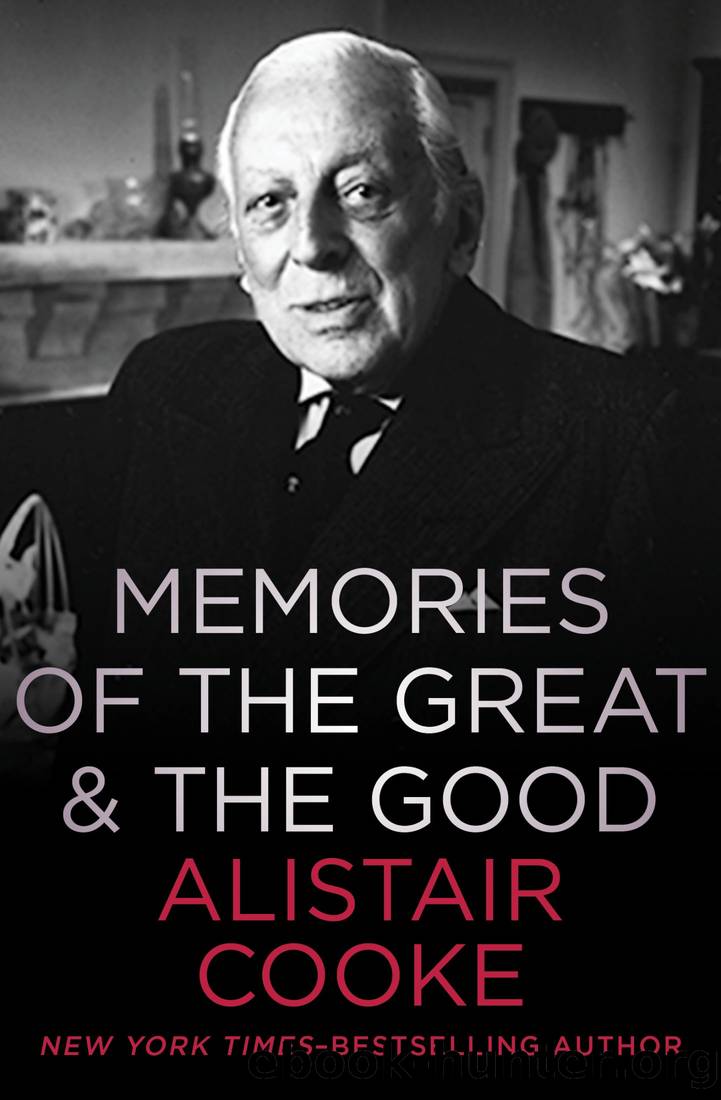Memories of the Great & the Good by Alistair Cooke

Author:Alistair Cooke [Cooke, Alistair]
Language: eng
Format: epub
Tags: Biography & Autobiography, Political, Literary Collections, essays, history, Modern, 20th Century
ISBN: 9781497697799
Google: 5LwnBgAAQBAJ
Publisher: Open Road Media
Published: 2015-03-03T23:49:22.580811+00:00
13
Goldwater: Jefferson in the Desert
(1998)
They call it, always called it since the white man came there, the Salt River Valley.
The trouble with the word âvalleyâ for those of us who live in temperate climates is: it calls up a picture of a cozy plain lying between the hills. But what I have in mind is a semitropical stretch of pure desert, forty miles east and west, twenty north and south, a vast silent plain of yellow, brown land: what Balzac called âGod, with Man left out.â The only upright things that interrupt the forty-mile flats are saguaro cactus trees, which look like spiky giants with their arms upraised in the act of surrender. Here the cold month is January, getting down as low as fifty degrees Fahrenheitâin midsummer, itâs mostly over a hundred degrees, in any discoverable shade. Here, for how many centuries nobody can truly guess, an Indian tribe built adobe houses, dug canals, prospered at farming and disappeared. The only name they are known by is unlikely to be their true name: Hohokamâmeaning âthe people who have gone.â
Flash forward to the late 1860s. Bang in the middle of this desert a white man, a prospector, pitched a tent, saw there was water from the nearby Salt River, and old canals to run through. He set up a hay camp, then grew other crops. (Contrary to the popular city folksâ belief, the desert is wonderfully fertileâthey always say âSpit on the desert and a flower will grow.â)
Within a year, along came a young man who would help the prospector build new canals and mount eight-mule teams to haul supplies forty miles to the nearest army camp. This pioneer was an Englishman with the improbable name of Darrel Duppa. As always in the West, an Englishman, on account of his fancy accent, was given a title. He was known in Arizona as âLordâ Darrel Duppa. He is describedâin the only book I can find a mention of himâas âan adventurer, scholar, inebriate and all-around regular fella.â He comes into the story here for one memorable reason. Once settled in this primitive village, he looked around at the prehistoric mounds and the ancient canalsâthought of the once-prospering tribe and thought to call this place after the mythical bird that was consumed by fire but always rose from the ashes. âFrom this village,â he said, âwill arise a city, Phoenix-like from the ashes of the past.â They called it Phoenix. It is so today, and it is the capital city of Arizona.
In no time, the village acquired the primitive necessities: adobe houses, a store or two, butcher shop, a rude hotel, half a dozen saloons andâthough it didnât yet have paved streets, it manufactured ice and delivered it in wheelbarrows. And once the railroad came through, bearing new westbound Americans, many of them stayed and baited the natives who, by then (a few hundred) were mostly Mexicans. There was not much rejoicing in those days in the prospect of multiculturalism, and weekend
Download
This site does not store any files on its server. We only index and link to content provided by other sites. Please contact the content providers to delete copyright contents if any and email us, we'll remove relevant links or contents immediately.
Machine Learning at Scale with H2O by Gregory Keys | David Whiting(4295)
Never by Ken Follett(3937)
Harry Potter and the Goblet Of Fire by J.K. Rowling(3848)
Unfinished: A Memoir by Priyanka Chopra Jonas(3381)
Fairy Tale by Stephen King(3370)
The Man Who Died Twice by Richard Osman(3072)
Will by Will Smith(2911)
Rationality by Steven Pinker(2352)
It Starts With Us (It Ends with Us #2) by Colleen Hoover(2344)
Can't Hurt Me: Master Your Mind and Defy the Odds - Clean Edition by David Goggins(2324)
The Dark Hours by Michael Connelly(2300)
The Storyteller by Dave Grohl(2229)
Friends, Lovers, and the Big Terrible Thing by Matthew Perry(2219)
The Dawn of Everything: A New History of Humanity by David Graeber & David Wengrow(2197)
The Becoming by Nora Roberts(2189)
The Stranger in the Lifeboat by Mitch Albom(2113)
Cloud Cuckoo Land by Anthony Doerr(2102)
Love on the Brain by Ali Hazelwood(2062)
Einstein: His Life and Universe by Walter Isaacson(2011)
